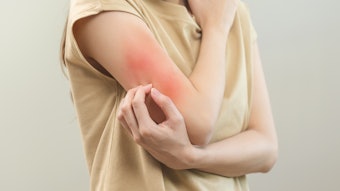
During the second day of Face & Body Midwest 2019, Regina Tucker gave event attendees a crash course for treating sensitive skin in her session "Sensitive Skin 101."
Tucker focused her class on the various forms for dermatitis, specifically contact dermatitis—a form of eczematous dermatitis that may result from direct irritation of the skin by a substance such as a chemical or an allergic reaction to a particular substance that has been in contact with the skin, injected or taken by mouth.
The three main types of contact dermatitis include:
- Irritant contact dermatitis—developed when the skin touches an irritating chemical.
- Allergic contact dermatitis—triggered by constant contact to a mild irritant over a long period of time.
- Contact uticaria (hives)—occurs immediately after the skin comes in contact with an irritating substance.
Sensitive skin is influenced by:
- Skin disorders—eczema, rosacea, psoriasis or dermatitis.
- Overly dry or injured skin that can no longer protect nerve endings, leading to skin reactions.
- Environmental factors.
- Genetics, age, gender, race, etc.
Symptoms include:
- Immediate reaction/irritation
- Swelling
- Dryness, itching, cracking, etc.
- A reaction that occurs over a period of weeks or months
- Blistering
- Weeping
- Irritation limited to the site of the original contact or spreads
- May be confused with another type of dermatitis
Common allergens consist of:
- Preservatives
- Fragrances
- Surfactants
- Emulsifiers
- Hair dyes
- Textile dyes
- Metals
- Topical medications
- Plastics
- Rubbers
- Adhesives
- Antibacterial ointments
Tucker stressed that product ingredients are among the most common irritants. She urged class attendees to know and master the ingredient lists on skin care products in order to become experts on sensitive skin.
Tips for Treating Sensitive Skin
- Conduct patch testing
- Avoid substances that cause reactions, i.e. hair dyes
- Look for products with the National Eczema Association (NEA) Seal of Acceptance
- Consult a dermatologist for topical medication
- Engage with CAMP—Contact Dermatitis Management Program
- Utilize Contact Allergen Replacement Database
- Read product labels and seek out hypoallergenic, non-comedogenic, and fragrance- and alcohol-free claims
- Pay attention to the manufacturing environment. Are products manufactured in a sterile environment?










